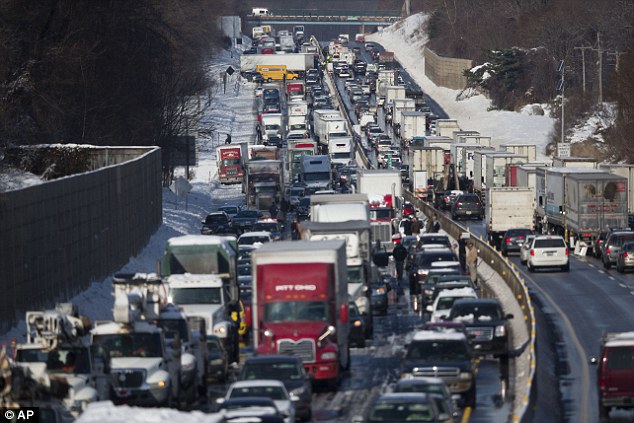Snow. Snow. More snow.
Disasters can bring out the best in people, but our wintry circumstances here in The City That Loves You Back have not gotten that bad yet.
We’ve not had that much snow in Philadelphia.
But while “record-breaking” exaggerates our hardship, there have certainly been kindnesses and conversations that would not have occurred without our almost daily 3, 6 or 12 inches. Unfortunately, glimmers of community are less apparent than the impatience and irritability that have begun to feel like a tantrum.
It’s probably been more encouraging in pockets where snowy conditions produced clearer disasters. For example, where a cohort of drivers, thrown together by chance and icy roads, responds to their shared misfortune by helping one another, sharing their water, groceries and first aid kits, and finding a laugh in what they could not change.
Did the drivers in all those cars and trucks below just sit tight and assume the authorities would come and straighten everything out? How long do you think it took them to turn to one another for a helping hand and camaraderie during the slow sorting out?

In A Paradise Built in Hell: the Extraordinary Communities That Arise in Disaster, Rebecca Solnit looked into natural and man-made catastrophes like the San Francisco earthquake and fire of 1906, 9/11, and Hurricane Katrina and found remarkable evidence of community re-building by victims from every station in life. Her argument is that “in the suspension of the usual order and the failure of most systems, we are free to live and act another way.” People rise to the occasion and become more generous, more enterprising and (paradoxically) more light-hearted than they were before.
For example, Solnit recounts dozens of individual stories after the 9/11 attacks, including that of Tobin James Mueller, who starts a single table donut dispensary for aid workers that expands dramatically into a way station for hundreds of firemen and ambulance workers on Pier 59 over the ensuing days.
Everyone here was rejected by the city’s official [emergency relief] sites. I accept anyone who wants to help and anything anyone wants to donate. We find a place for everything and everyone. A hopeful would-be volunteer comes up to me and asks if there is anything she can do. I give her a task, and that’s the last direction I need to give. Each volunteer becomes a self-motivated powerhouse who does whatever it takes to get the job done. Then they find a hundred more jobs to do. There is so much to do. It’s so much fun to participate in. I forget to sleep. Many of my volunteers have been working for over 36 hours. It is difficult to bring oneself to go back home. The thought of closing my eyes makes me tremble.
The people Solnit celebrates in A Paradise Build in Hell are not “nasty and brutish and short” and in need of managing by official society. Overwhelmingly, they are people who know perfectly well how to act when the social order has ground to a halt and they are free to rely on their resourcefulness and shared humanity.
Time and again, in post-disaster zones, she finds that it is representatives of the broken social order (such as the police and the military) who resort to violence because of their erroneous assumption that victims will quickly devolve into savages once society’s “safeguards” are removed. Solnit’s message throughout is that nothing could be farther from the truth. In philosopher William James’ observation during the aftermath of the San Francisco earthquake: “energies slumbering” are awakened, and suffering and loss are transformed when they become shared experiences.
On this snow day, the questions are really quite simple.
-Why can’t problem solving in our everyday communities be more satisfying, resourceful, engaged and light-hearted, so that “disasters can just be disasters” and not the random opportunities for liberation that they are today?
-Why don’t our fleeting experiences of a better world after disaster give us the confidence to come together and build a more humane society?
-Why didn’t the solidarity so many of us experienced after 9/11, Hurricane Sandy, the terrorism at the Boston Marathon or the massacre of first graders in Newtown have a more permanent half-life?
-Why do we revert so readily to fear instead of to trust?
It is the middle of February. There hasn’t been enough snow in Philadelphia yet.
But we still have a few weeks left.
Leave a Reply